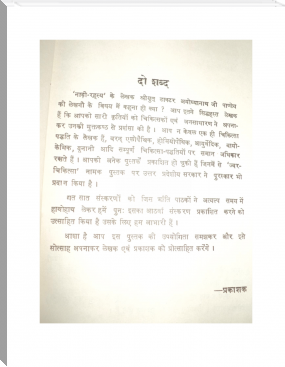LYSBETH, H. RIDER HAGGARD [brene brown rising strong txt] 📗

- Author: H. RIDER HAGGARD
Book online «LYSBETH, H. RIDER HAGGARD [brene brown rising strong txt] 📗». Author H. RIDER HAGGARD
Then at last his chance had come. Ramiro, thinking that now he could never turn against him, had given him Elsa, and left him with her while he went about his duties and to secure a share of the plunder, meaning to deal with his prisoners on the morrow. So he, Adrian, a man in authority, had provided the boat and freed them. That was all he had to say, except to renounce any claim upon her who was called his wife, and to beg their forgiveness.
Foy listened to the end. Then, dropping his oar for a moment, he put his arm about Adrian's waist and hugged him, saying in his old cheery voice:
"I was right after all. You know, Adrian, I always stood up for you, notwithstanding your temper and queer ways. No, I never would believe that you were a villain, but neither could I ever have believed that you were quite such an ass."
To this outspoken estimate of his character, so fallen and crushed was he, his brother had not the spirit to reply. He could merely tug at his oar and groan, while the tears of shame and repentance ran down his pale and handsome face.
"Never mind, old fellow," said Foy consolingly. "It all went wrong, thanks to you, and thanks to you I believe that it will all come right again. So we will cry quits and forget the rest."
Poor Adrian glanced up at Foy and at Elsa sitting on the thwart of the boat by his side.
"Yes, brother," he answered, "for you and Elsa it may come right, but not for me in this world, for I--I have sold myself to the devil and-- got no pay."
After that for a while no one spoke; all felt that the situation was too tragic for speech; even the follies, and indeed the wickedness, of Adrian were covered up, were blotted out in the tragedy of his utter failure, yes, and redeemed by the depth of his atonement.
The grey light of the summer morning began to grow on the surface of the great inland sea. Far behind them they beheld the sun's rays breaking upon the gilt crown that is set above the tower of St. Bavon's Church, soaring over the lost city of Haarlem and the doomed patriots who lay there presently to meet their death at the murderer's sword. They looked and shuddered. Had it not been for Adrian they would be prisoners now, and what that meant they knew. If they had been in any doubt, what they saw around must have enlightened them, for here and there upon the misty surface of the lake, or stranded in its shallows, were the half-burnt out hulls of ships, the remains of the conquered fleet of William the Silent; a poor record of the last desperate effort to relieve the starving city. Now and again, too, something limp and soft would cumber their oars, the corpse of a drowned or slaughtered man still clad perchance in its armour.
At length they passed out of these dismal remains of lost men, and Elsa could look about her without shuddering. Now they were in fleet water, and in among the islands whereon the lush summer growth of weeds and the beautiful marsh flowers grew as greenly and bloomed as bright as though no Spaniard had trampled their roots under foot during all those winter months of siege and death. These islets, scores and hundreds of them, appeared on every side, but between them all Martha steered an unerring path. As the sun rose she stood up in the boat, and shading her eyes with her hand to shut out its level rays, looked before her.
"There is the place," she said, pointing to a little bulrush-clad isle, from which a kind of natural causeway, not more than six feet wide, projected like a tongue among muddy shallows peopled by coots and water-hens with their red-beaked young.
Martin rose too. Then he looked back behind him and said;
"I see the cap of a sail upon the skyline. It is Ramiro."
"Without doubt," answered Martha calmly. "Well, we have the half of an hour to work in. Pull, bow oar, pull, we will go round the island and beach her in the mud on the further side. They will be less likely to see us there, and I know a place whence we can push off in a hurry."
CHAPTER XXIX(ADRIAN COMES HOME AGAIN)
They landed on the island, wading to it through the mud, which at this spot had a gravelly bottom; all of them except Elsa, who remained on the boat to keep watch. Following otter-paths through the thick rushes they came to the centre of the islet, some thirty yards away. Here, at a spot which Martha ascertained by a few hurried pacings, grew a dense tuft of reeds. In the midst of these reeds was a duck's nest with the young just hatching out, off which the old bird flew with terrified quackings.
Beneath this nest lay the treasure, if it were still there.
"At any rate the place has not been disturbed lately," said Foy. Then, even in his frantic haste, lifting the little fledglings--for he loved all things that had life, and did not wish to see them hurt--he deposited them where they might be found again by the mother.
"Nothing to dig with," muttered Martin, "not even a stone." Thereon Martha pushed her way to a willow bush that grew near, and with the smaller of the two axes, which she held in her hand, cut down the thickest of its stems and ran back with them. By the help of these sharpened stakes, and with their axes, they began to dig furiously, till at length the point of Foy's implement struck upon the head of a barrel.
"The stuff is still here, keep to it, friends," he said, and they worked on with a will till three of the five barrels were almost free from the mud.
"Best make sure of these," said Martin. "Help me, master," and between them one by one they rolled them to the water's edge, and with great efforts, Elsa aiding them, lifted them into the boat. As they approached with the third cask they found her staring white-faced over the tops of the feathery reeds.
"What is it, sweet?" asked Foy.
"The sail, the following sail," she answered.
They rested the barrel of gold upon the gunwale and looked back across the little island. Yes, there it came, sure enough, a tall, white sail not eight hundred yards away and bearing down straight upon the place. Martin rolled the barrel into position.
"I hoped that they would not find it," he said, "but Martha draws maps well, too well. Once, before she married, she painted pictures, and that is why."
"What is to be done?" asked Elsa.
"I don't know," he answered, and as he spoke Martha ran up, for she also had seen the boat. "You see," he went on, "if we try to escape they will catch us, for oars can't race a sail."
"Oh!" said Elsa, "must we be taken after all?"
"I hope not, girl," said Martha, "but it is as God wills. Listen, Martin," and she whispered in his ear.
"Good," he said, "if it can be done, but you must watch your chance. Come, now, there is no time to lose. And you, lady, come also, for you can help to roll the last two barrels."
Then they ran back to the hole, whence Foy and Adrian, with great toil, had just dragged the last of the tubs. For they, too, had seen the sail, and knew that time was short.
"Heer, Adrian," said Martin, "you have the cross-bow and the bolts, and you used to be the best shot of all three of us; will you help me to hold the causeway?"
Now Adrian knew that Martin said this, not because he was a good shot with the cross-bow, but because he did not trust him, and wished to have him close to his hand, but he answered:
"With all my heart, as well as I am able."
"Very good," said Martin. "Now let the rest of you get those two casks into the boat, leaving the Jufvrouw hidden in the reeds to watch by it, while you, Foy and Martha, come back to help us. Lady, if they sail round the island, call and let us know."
So Martin and Adrian went down to the end of the little gravelly tongue and crouched among the tall meadow-sweet and grasses, while the others, working furiously, rolled the two barrels to the water-edge and shipped them, throwing rushes over them that they might not catch the eye of the Spaniards.
The sailing boat drew on. In the stern-sheets of it sat Ramiro, an open paper, which he was studying, upon his knee, and still slung about his body the great sword Silence.
"Before I am half an hour older," reflected Martin, for even now he did not like to trust his thoughts to Adrian, "either I will have that sword back again, or I shall be a dead man. But the odds are great, eleven of them, all tough fellows, and we but three and two women."
Just then Ramiro's voice reached them across the stillness of the water.
"Down with the sail," he cried cheerily, "for without a doubt that is the place--there are the six islets in a line, there in front the other island shaped like a herring, and there the little promontory marked 'landing place.' How well this artist draws to be sure!"
The rest of his remarks were lost in the creaking of the blocks as the sail came down.
"Shallow water ahead, Senor," said a man in the bows sounding with a boat hook.
"Good," answered Ramiro, throwing out the little anchor, "we will wade ashore."
As he spoke the Spanish soldier with the boat-hook suddenly pitched head first into the water, a quarrel from Adrian's crossbow through his heart.
"Ah!" said Ramiro, "so they are here before us.





Comments (0)